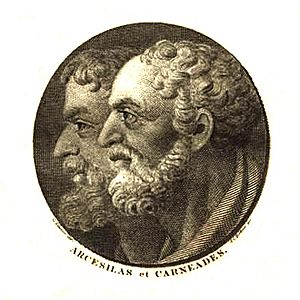Arcesilaus facts for kids
Quick facts for kids
Arcesilaus
|
|
|---|---|

Arcesilaus and Carneades
|
|
| Born | 316/5 BC Pitane, Aeolis
(modern-day Çandarlı, Izmir, Turkey) |
| Died | 241/0 BC |
| Era | Hellenistic philosophy |
| Region | Western philosophy |
| School | Academic Skepticism |
|
Main interests
|
Epistemology |
|
Notable ideas
|
Founder of Academic Skepticism |
Arcesilaus (born 316/5 BC – died 241/0 BC) was an important Greek Hellenistic thinker. He started a new way of thinking called Academic Skepticism. This was a period when the famous Platonic Academy started to question if we can truly know things.
Arcesilaus became the head of the Platonic Academy around 264 BC. He followed Crates of Athens in this role. Arcesilaus did not write down his ideas. Because of this, we only know his thoughts from what other writers said about him later.
In Athens, Arcesilaus met Timon of Phlius, a philosopher who believed in skepticism. This means doubting whether we can ever be sure about anything. Timon's ideas likely influenced Arcesilaus. Arcesilaus became the first Academic to strongly doubt if our senses can find the truth. He started the skeptical phase of the Academy.
His main opponent was Zeno of Citium, who founded Stoicism. Zeno believed that reality could be understood with certainty. Arcesilaus disagreed with this idea.
Life of Arcesilaus
Arcesilaus was born in a place called Pitane. This area is now part of modern-day Turkey. His first teacher was a mathematician named Autolycus. Arcesilaus moved with him to Sardis.
Later, Arcesilaus studied rhetoric in Athens. Rhetoric is the art of speaking and writing well. After that, he began studying philosophy. He learned from Theophrastus and Crantor. He also spent time at the school of Pyrrho, who was a famous skeptic.
Arcesilaus became good friends with Polemo and Crates of Athens. Crates chose Arcesilaus to be his successor. This meant Arcesilaus became the new scholarch, or head, of the Platonic Academy. Arcesilaus was highly respected by the people of Athens.
Arcesilaus's Philosophy
Arcesilaus never wrote down his philosophical ideas. This makes it hard for us to fully understand them today. We only know his thoughts from what later writers said. This has led to different ideas about what his skepticism truly meant.
Some people think his philosophy was completely negative. They believe he aimed to destroy all other philosophical views. Others think he simply believed that nothing could be truly known. Still others claimed he had no strong beliefs on any topic, including whether knowledge was possible.
A philosopher named Aristo of Chios described Arcesilaus's thinking. He said Arcesilaus seemed like a follower of Plato. But his teaching style was like Diodorus, and his actual philosophy was similar to Pyrrhonism. This means he doubted everything.
Eusebius wrote that Arcesilaus studied with Pyrrho. He said Arcesilaus followed Pyrrhonism in every way except for the name. Other Pyrrhonist thinkers also called him a Pyrrhonist. This was because he questioned what was true, what was false, and what was convincing.
Arcesilaus claimed he was not creating new ideas. Instead, he said he was bringing back Plato's original way of thinking. He believed Plato's Academy was meant to be free of fixed beliefs. So, he thought he was restoring Plato's ideas in their pure form.
However, Cicero said Arcesilaus often stated, "he knew nothing, not even his own ignorance." This sounds like a very strong doubt. Some historians believe Arcesilaus used such statements to make his students think deeply. Others think he truly doubted the deeper meanings in Plato's works. He might have believed he was removing false ideas from Plato's teachings.
Cicero also shared an argument that Arcesilaus used:
- It is wrong to agree with something that is false or unknown.
- But, nothing can be truly known for sure.
- Therefore, we should not make any judgments about anything. We should "suspend judgment."
Zeno of Citium and other Stoics were Arcesilaus's main opponents. The Stoics believed in something called katalêptikê phantasia. This was a "convincing impression" that could lead to certain knowledge. Arcesilaus argued that such a thing could not exist. He said it was impossible to have an impression that was always true. An impression could be false just as easily as it could be true. He believed the Stoics were just adding a new name without a real meaning.
See also
 In Spanish: Arcesilao para niños
In Spanish: Arcesilao para niños
 | John T. Biggers |
 | Thomas Blackshear |
 | Mark Bradford |
 | Beverly Buchanan |

